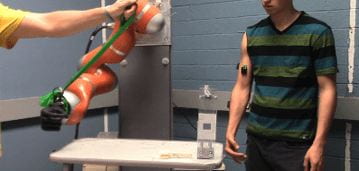Graduate Programs
MASTER OF SCIENCE IN ROBOTICS
 The MSR program consists of 30 credit hours of graduate level coursework, and offers a Masters thesis track or a course-based only track. The curriculum consists of a core of six (6) required courses, and four (4) electives. The latter are selected from an approved list of graduate courses and are designed to provide the opportunity for specialization in particular academic subareas such as control, estimation, optimization, or machine learning.
The MSR program consists of 30 credit hours of graduate level coursework, and offers a Masters thesis track or a course-based only track. The curriculum consists of a core of six (6) required courses, and four (4) electives. The latter are selected from an approved list of graduate courses and are designed to provide the opportunity for specialization in particular academic subareas such as control, estimation, optimization, or machine learning.
One of the unique aspects of the MSR program at UD is in leveraging the campus-wide facilities, expertise, and existing faculty collaborations, to expose its students within the normal curriculum, to aspects of implementation and utilization of robotic systems in atmo/litho/hydro-spheres.
Students interested in our full-time campus experience are able to complete all degree requirements below, including the optional thesis, in as little as 18 to 24 months. See admission requirements and application information below.
Robotics is an interdisciplinary field that requires crossing the boundaries of traditional engineering disciplines. In the face of the rising expenditures on robotics, there will be a continuing and increasing need for skilled interdisciplinary engineers to design, build, and program robots in the future. This interdisciplinary Master of Science in Robotics (MSR) program is answering the societal, government, and industry need for specialized education in this field.
DEGREE REQUIREMENTS
The program builds on some of the unique strengths, resources, and expertise that can be identified across the University of Delaware campus, to offer a higher education and professional training opportunity that cannot be easily replicated.
Required Courses (18 credits)
Six (6) Required Courses:
MEEG 621 Linear Systems
CISC 621 Algorithm Design and Analysis
MEEG 671 Introduction to Robotics
MEEG 678 Introduction to Autonomous Driving
CISC 642 Introduction to Computer Vision
MAST 632 Environmental Field Robotics
Graduate-Level Engineering Electives (12 credits)
Four (4) graduate-level engineering electives are required. The following courses are pre-approved:
CISC 681 Artificial Intelligence
CISC 684 Introduction to Machine Learning
MEEG 620 Intermediate Dynamics
MEEG 677 Introduction to State Estimation
MEEG 698 Stochastic Optimal Control
MEEG 829 Applied Nonlinear Control
MEEG 877 Sensing and Estimation in Robotics
MEEG 890 Nonlinear Programming
MEEG 894 Linear Feedback Control Design
MEEG 895 Game Theory & Mechanism Design
BMEG 441/667 Biomechatronics
MEEG 467/667 Soft Robots: design, Principles and Applications
Graduate-level independent study can substitute for up to six (6) graduate elective credits along a non-thesis degree track. Independent study activities can take place outside the campus, in the context of semester-long internships with approved industry or government partners, but always under the supervision and oversight of a faculty member from the participating academic units, who will be ultimately responsible for assigning a grade for the course.
Thesis Option
A student pursuing the Thesis option can request to count six (6) credits of Master’s Thesis towards the required course credits.
Suggested Academic Concentrations (Optional)
We offer five (5) main concentrations, with the following suggested courses:
- Control:
MEEG 621 (Linear Systems); MEEG 698 (Stochastic Optimal Control) or MEEG 894 (Linear Feed-back Control Design); MEEG 829 (Applied Nonlinear Control) - Estimation:
MEEG 621 (Linear Systems); MEEG 677 (Introduction to State Estimation); MEEG 877 (Sensing and Estimation in Robotics) - Artificial Intelligence:
CISC 621 (Algorithm Design and Analysis); CISC 684 (Intro to Machine Learning); CISC 642 (Computer Vision) - Design:
MEEG 620 (Dynamics); MEEG 671 (Intro to Robotics); MAST 632 (Environmental Field Robotics) - Optimization:
CISC 621 (Algorithms); MEEG 895 (Game Theory and Mechanism Design); MEEG 890 (Nonlinear Programming)
“My graduate studies at UD gave me adequate knowledge to kick off my first job in building self-driving cars, and laid a good foundation for my later career.”
ADMISSION REQUIREMENTS
The requirements for admission to the MSR program are the following:
- A baccalaureate degree in mechanical engineering or in a closely allied field of science or mathematics. Applicants with degrees in other disciplines may be admitted with provisional status and may be required to complete prerequisite courses that are deemed necessary for appropriate preparation for courses in the program.
- An undergraduate grade point average in engineering, science and mathematics courses of at least 3.0 on a 4.0 scale.
- The Graduate Record Examination (GRE) combined Quantitative and Verbal score of 308 (1200). Waivers may be considered on a case-by-case basis, with documented approval by the Department of Mechanical Engineering’s Admissions Committee.
- International applicants: The TOEFL with a minimum of 100 on the IBT and a speaking score of 20. IELTS with a minimum score of 6.5 with no individual sub-score below 6.0 on the IELTS alternative.
- Three letters of recommendation from former teachers or supervisors.
- Resume
- Statement of Purpose
All items should be uploaded into your graduate application (https://grad-admissions.udel.edu/apply/). Admission is selective and competitive based on the number of well qualified applicants and the research opportunities available with the faculty. Meeting the stated minimum academic requirements does not guarantee admission.
Application Deadlines
MSR Fall Admission
- January 31: Priority consideration for admission
- July 31: Final deadline to apply
MSR Spring Admission
- October 31: Priority consideration for admission
- December 31: Final deadline to apply
Tuition rates of all programs can be seen on the Graduate Office’s Tuition webpage.
See official program policy statement for details.
For more information about this program, contact msr-info@udel.edu or call (302) 831-2423.
